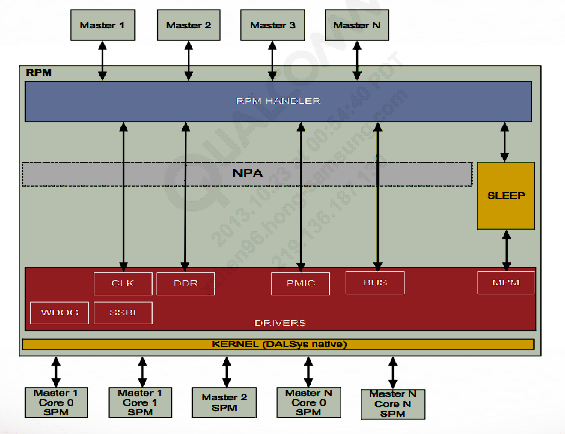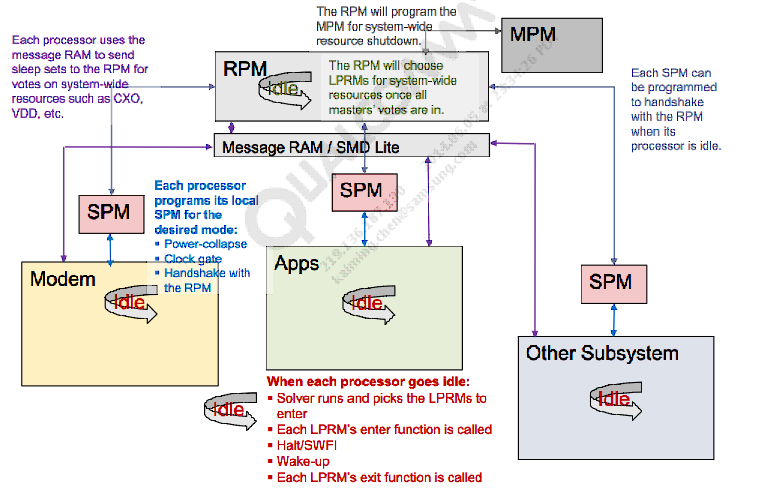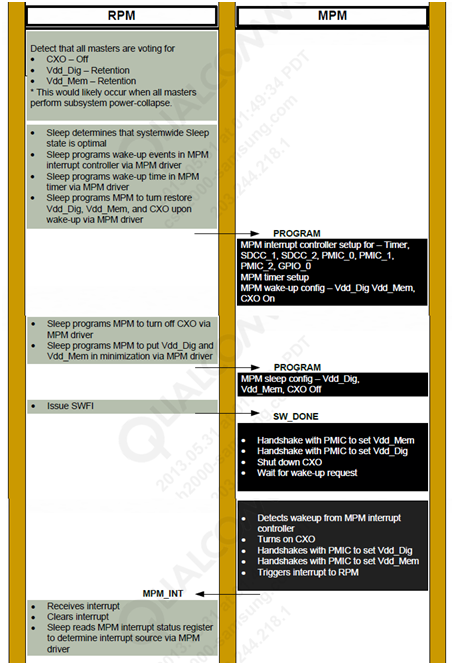我是
靠谱客的博主
玩命玫瑰,这篇文章主要介绍
MSM平台RPM,现在分享给大家,希望可以做个参考。
Software Component Block Diagram
RPM(Resource Power Manager)是高通MSM平台另外加的一块芯片,虽然与AP芯片打包在一起,但其是一个独立的ARM Core。之所以加这个东西,就是要控制整个电源相关的shared resources,比如ldo,clock。负责与SMP,MPM交互进入睡眠或者唤醒整个系统。
以下是高通文档中对各个功能模块的说明。

- Kernel – DALSys-based lightweight kernel
- RPM handler – RPM handler abstracts the RPM message protocol away
from other software - Drivers – Drivers for each of the resources supported by the RPM will
register with RPM handler to request notification when requests are
received for the resource which the driver controls - NPA – A driver may use the Node Power Architecture (NPA) to represent
resources controlled by the driver - Clock driver – RPM clock driver directly handles aggregating requests
from each of the masters for any of the systemwide clock resources
controlled by the RPM - Bus arbitration driver – RPM bus arbiter driver takes bus arbiter settings
as requests from the different masters in the system and aggregates them
to represent the frequency-independent system settings - PMIC – RPM PMIC driver directly aggregates requests from each of the
masters for any of the systemwide PMIC resources controlled by the RPM - Watch Dog driver – Watch Dog driver is a fail-safe for incorrect or stuck
code - MPM driver – Used to program the MPM hardware block during
systemwide sleep - RPM message driver – RPM message protocol driver abstracts the RPM
message protocol away from other subsystem software
Messaging Masters
与RPM通过shared memory region交互进行dynamic and static resource/power management的可以有很多种。
这个可以查看smd_type.h中的smd_channel_type。但目前看只有AP,MODEM,RIVA,TZ与RPM有交互,这个可以看message_ram_malloc()函数中的设置。
其实也可以间接从rpm_config.c文件中的SystempData temp_config_data这个变量中看出来到底有几个部分是与RPM进行交互的。
RPM Initialization
在main.c文件中会逐个调用init_fcns[]变量中的函数进行初始化。当然也包括上面的资源的初始化。
const init_fcn init_fcns[] =
{
populate_image_header,
npa_init,
#if (!defined(MSM8909_STUBS) )
railway_init_v2,
#endif
PlatformInfo_Init,
pm_init,
acc_init,
#if (!defined(MSM8909_STUBS) )
railway_init_early_proxy_votes,
#endif
(init_fcn)Clock_Init,
__init_stack_chk_guard,
ddr_init,
smem_init,
init_smdl,
version_init,
rpmserver_init,
rpm_server_init_done,
railway_init_proxies_and_pins,
#if (!defined(MSM8909_STUBS) )
rbcpr_init,
#endif
svs_init,
vmpm_init,
sleep_init,
#if (!defined(MSM8909_STUBS) )
QDSSInit,
#endif
exceptions_enable,
swevent_qdss_init,
icb_init,
#if (!defined(MSM8909_STUBS) )
debug_init,
system_db_init,
zqcal_task_init,
#endif
rpm_settling_timer_init,
gpio_toggle_init,
rpm_set_changer_common_init,
}
- 1
- 2
- 3
- 4
- 5
- 6
- 7
- 8
- 9
- 10
- 11
- 12
- 13
- 14
- 15
- 16
- 17
- 18
- 19
- 20
- 21
- 22
- 23
- 24
- 25
- 26
- 27
- 28
- 29
- 30
- 31
- 32
- 33
- 34
- 35
- 36
- 37
- 38
- 39
- 40
- 41
- 42
- 43
- 44
- 45
- 46
- 47
- 48
- 49
- pm_init : LDO等资源的注册,然后接收rpm_message。接收rpm_message的部分高通代码没有给,所以看不到,但从rpm log来看,是有接收处理并反馈的过程的。
107.764902: rpm_message_received (master: "APSS") (message id: 723)
107.764908: rpm_svs (mode: RPM_SVS_FAST) (reason: imminent processing)
107.764924: rpm_svs (mode: RPM_SVS_FAST) (reason: imminent processing)
107.764939: rpm_process_request (master: "APSS") (resource type: ldoa) (id: 14)
107.764942: rpm_xlate_request (resource type: ldoa) (resource id: 14)
107.764946: rpm_apply_request (resource type: ldoa) (resource id: 14)
107.765033: rpm_send_message_response (master: "APSS")
ldoa对应的resource type为RPM_LDO_A_REQ。这个在pm_rom_device_init()里的pm_rpm_ldo_register_resources(RPM_LDO_A_REQ, num_of_ldoa); 这里被注册,所以看进去最后xlate和apply最终都会被pm_rpm_ldo_translation()和pm_rpm_ldo_apply进行处理。pm_rpm_ldo_tranlation()读取kvp内容,pm_rpm_ldo_apply最终把request的内容设置上去。
kernel端在msm-pm8916-rpm-regulator.dtsi文件中定如下ldo内容
2. (init_fcn)Clock_Init:Clock资源的注册,这个过程和上面的也差不多
3. rpmserver_init:启动接收message的进程
比如要设置LDO3的电压和电流,kvp的内容如下:
{
“req0” : {
{“rsrc” : “ldo0”}
{“id” : 3}
{“set” : 0}
{“data” : {
{“uv��” : 1100000}
{“mA00” : 130}
}
}
}
}
RPM log里边显示是APSS,这个在kernel里边也是有设置的,在msm-pm8916-rpm-regulator.dtsi里的
rpm-regulator-ldoa14 {
compatible = "qcom,rpm-smd-regulator-resource";
qcom,resource-name = "ldoa";
qcom,resource-id = <14>;
qcom,regulator-type = <0>;
qcom,hpm-min-load = <5000>;
status = "disabled";
regulator-l14 {
compatible = "qcom,rpm-smd-regulator";
regulator-name = "8916_l14";
qcom,set = <3>;
status = "disabled";
};
};
MSM的retulator相关的驱动会读取这个,如果有需要发请求的话,会根据这个dtsi的内容,组织kvp,然后通过rpm_request通道发过去。
rpm_request通道在rpm里边打开的地方是在rpm_handler.cpp里边的Hander::init()函数
void Handler::init()
{
smdlPort_ = smdl_open("rpm_requests",
rpm->ees[ee_].edge,
SMDL_OPEN_FLAGS_MODE_PACKET,
rpm->ees[ee_].smd_fifo_sz,
(smdl_callback_t)rpm_smd_handler,
this);
}
在对应的kernel端也有打开,可以参考msm8916.dtsi文件里边的设置。
rpm_bus: qcom,rpm-smd {
compatible = "qcom,rpm-smd";
rpm-channel-name = "rpm_requests";
rpm-channel-type = <15>;
};
以下是注册资源的函数和资源的类型:
所有的资源都通过rpm_register_resource()函数注册。这些资源包括clock, ldo等。具体可以看下面的类型定义。
typedef enum
{
RPM_TEST_REQ = 0x74736574,
RPM_CLOCK_0_REQ = 0x306b6c63,
RPM_CLOCK_1_REQ = 0x316b6c63,
RPM_CLOCK_2_REQ = 0x326b6c63,
RPM_CLOCK_QPIC_REQ = 0x63697071,
RPM_BUS_SLAVE_REQ = 0x766c7362,
RPM_BUS_MASTER_REQ = 0x73616d62,
RPM_BUS_SPDM_CLK_REQ = 0x63707362,
RPM_BUS_MASTER_LATENCY_REQ = 0x74616c62,
RPM_SMPS_A_REQ = 0x61706D73,
RPM_LDO_A_REQ = 0x616F646C,
RPM_NCP_A_REQ = 0x6170636E,
RPM_VS_A_REQ = 0x617376,
RPM_CLK_BUFFER_A_REQ = 0x616B6C63,
RPM_BOOST_A_REQ = 0x61747362,
RPM_SMPS_B_REQ = 0x62706D73,
RPM_LDO_B_REQ = 0x626F646C,
RPM_NCP_B_REQ = 0x6270636E,
RPM_VS_B_REQ = 0x627376,
RPM_CLK_BUFFER_B_REQ = 0x626B6C63,
RPM_BOOST_B_REQ = 0x62747362,
RPM_SWEVENT_REQ = 0x76657773,
RPM_OCMEM_POWER_REQ = 0x706d636f,
RPM_RBCPR_REQ = 0x727063,
RPM_GPIO_TOGGLE_REQ = 0x6F697067,
} rpm_resource_type;
- 1
- 2
- 3
- 4
- 5
- 6
- 7
- 8
- 9
- 10
- 11
- 12
- 13
- 14
- 15
- 16
- 17
- 18
- 19
- 20
- 21
- 22
- 23
- 24
- 25
- 26
- 27
- 28
RPM Resouce Registration
- rpm_register_resource():
Gpio_toggle.c (x:j3_ctcnhlosrpm_proccorepowerrpmcommon): rpm_register_resource(RPM_GPIO_TOGGLE_REQ, 3, sizeof(gpio_toggle_inrep), gpio_toggle_xlate, gpio_toggle_apply, 0);
Icb_rpm_spdm_req.c (x:j3_ctcnhlosrpm_proccorebusesicbsrccommon): rpm_register_resource( RPM_BUS_SPDM_CLK_REQ,
Ocmem_resource.c (x:j3_ctcnhlosrpm_proccorepowerocmemsrc): rpm_register_resource(RPM_OCMEM_POWER_REQ, 3, sizeof(rpm_ocmem_vote_int_rep), rpm_ocmem_xlate, rpm_ocmem_apply, 0);
Pm_rpm_boost_trans_apply.c (x:j3_ctcnhlosrpm_proccoresystemdriverspmicnpasrcrpm): rpm_register_resource(resourceType, num_npa_resources + 1 , sizeof(pm_npa_boost_int_rep), pm_rpm_boost_translation, pm_rpm_boost_apply, (void *)boost_data);
Pm_rpm_clk_buffer_trans_apply.c (x:j3_ctcnhlosrpm_proccoresystemdriverspmicnpasrcrpm): rpm_register_resource(resourceType, num_npa_resources + 1,
Pm_rpm_ldo_trans_apply.c (x:j3_ctcnhlosrpm_proccoresystemdriverspmicnpasrcrpm): rpm_register_resource(resourceType, num_npa_resources + 1, sizeof(pm_npa_ldo_int_rep), pm_rpm_ldo_translation, pm_rpm_ldo_apply, (void *)ldo_data);
Pm_rpm_smps_trans_apply.c (x:j3_ctcnhlosrpm_proccoresystemdriverspmicnpasrcrpm): rpm_register_resource(resourceType, num_npa_resources + 1, sizeof(pm_npa_smps_int_rep), pm_rpm_smps_translation, pm_rpm_smps_apply, (void *)smps_data);
Pm_rpm_vs_trans_apply.c (x:j3_ctcnhlosrpm_proccoresystemdriverspmicnpasrcrpm): rpm_register_resource(resourceType, num_npa_resources + 1, sizeof(pm_npa_vs_int_rep), pm_rpm_vs_translation, pm_rpm_vs_apply, (void *)vs_data);
Rpmserver.cpp (x:j3_ctcnhlosrpm_proccorepowerrpmserver):void rpm_register_resource
Rpmserver.h (x:j3_ctcnhlosrpm_proccoreapipower):void rpm_register_resource
Rpm_npa.cpp (x:j3_ctcnhlosrpm_proccorepowerrpmserver): rpm_register_resource(resource, num_npa_resources, sizeof(npa_request_data_t), rpm_npa_xlate, rpm_npa_apply, adapter);
Rpm_npa.cpp (x:j3_ctcnhlosrpm_proccorepowerrpmserver): rpm_register_resource(resource, num_npa_resources, sizeof(npa_request_data_t), rpm_npa_xlate, rpm_npa_apply, adapter);
Rpm_test_resource.cpp (x:j3_ctcnhlosrpm_proccorepowerrpmserver): rpm_register_resource(RPM_TEST_REQ, 1, 4, rpm_test_xlate, rpm_test_apply, 0);
Swevent.c (x:j3_ctcnhlosrpm_proccorepowerrpmcommon): rpm_register_resource(RPM_SWEVENT_REQ, 1, sizeof(swevent_inrep), rpm_swevent_xlate, rpm_trace_control, 0);
- 1
- 2
- 3
- 4
- 5
- 6
- 7
- 8
- 9
- 10
- 11
- 12
- 13
- 14
- 15
- 16
- 17
- 18
- 19
- 20
- 21
- 22
- 23
- 24
- 25
- 26
所有的资源都是通过rpm_register_resource函数注册。可以看到像RPM_BUS_SPDM_CLK_REQ,RPM_GPIO_TOGGLE_REQ都是通过这个接口直接注册的。
- NPA相关也是通过rpm_register_resource注册,但是用了NPA的driver去实际注册资源和使用资源。
NPA相关的两个注册接口是:rpm_create_npa_adapter(),rpm_create_npa_settling_adapter()。
可以看到这两个就注册了三个CLOCK相关的资源,
---- rpm_create_npa_adapter Matches (8 in 5 files) ----
ClockRPM.c : clk0_adapter = rpm_create_npa_adapter(RPM_CLOCK_0_REQ, 3)
ClockRPM.c : clk1_adapter = rpm_create_npa_adapter(RPM_CLOCK_1_REQ, 2)
Rpmserver.h :rpm_npa_adapter rpm_create_npa_adapter(rpm_resource_type resource, unsigned num_npa_resources)
Rpm_npa.cpp :rpm_npa_adapter rpm_create_npa_adapter(rpm_resource_type resource, unsigned num_npa_resources)
---- rpm_create_npa_settling_adapter Matches (5 in 5 files) ----
ClockRPM.c : clk2_adapter = rpm_create_npa_settling_adapter(RPM_CLOCK_2_REQ, 1)
Rpmserver.h :rpm_npa_adapter rpm_create_npa_settling_adapter(rpm_resource_type resource, unsigned num_npa_resources)
Rpm_npa.cpp :rpm_npa_adapter rpm_create_npa_settling_adapter(rpm_resource_type resource, unsigned num_npa_resources)
NPA client的创建函数是:npa_create_sync_client()
NPA clien request的函数是:npa_issue_required_request()
NPA client创建并request这个资源,必须要适用像下面这样的npa node。这个可以直接像下面这样定义。然后再使用。步骤如下:
1.定义npa node definition
static npa_resource_definition sleep_uber_resource[] =
{
{
"/sleep/uber",
"on/off",
0x7,
&npa_or_plugin,
NPA_RESOURCE_DEFAULT,
NULL,
}
};
npa_node_definition sleep_uber_node =
{
"/node/sleep/uber",
sleep_uber_driver,
NPA_NODE_DEFAULT,
NULL,
0, NULL,
NPA_ARRAY(sleep_uber_resource)
};
- 1
- 2
- 3
- 4
- 5
- 6
- 7
- 8
- 9
- 10
- 11
- 12
- 13
- 14
- 15
- 16
- 17
- 18
- 19
- 20
- 21
2.npa_define_node(&sleep_uber_node, initial_state, NULL),调用这个函数初始化这个NPA node
3.创建Client
uber_node_handle = npa_create_sync_client("/sleep/uber",
"sleep",
NPA_CLIENT_REQUIRED)
4.npa_issue_required_request(uber_node_handle, request) : request
RPM Resource handle
当子系统通过share memory发送请求给RPM。RPM负责处理这些请求并设置。RPM处理请求的流程如下:
SMD IRQ ->smd_isr()->rpm_smd_handler() [在Handler::init函数中注册的,rpm_request channel的SMD处理函数]->Handler::queue()->schedule_me()->Handler::execute_until()->Handler::processMessage()->resource_ee_request()->发到每个资源注册xlate然后再调用apply等
下面以高通控制DDR频率(BIMC)的过程为例,看一下kernel这边怎么发送请求给RPM的。
device tree设置如下:
cpubw: qcom,cpubw@0 {
reg = <0 4>;
compatible = "qcom,devbw";
governor = "cpufreq";
qcom,src-dst-ports = <1 512>;
qcom,active-only;
qcom,bw-tbl =
< 762 >,
< 1525 >,
< 3051 >,
< 4066 >;
};
对应的kernel代码在devfeq_devbw.c文件。根据算法算出当前应该设定的ddr总线频率之后,最后通过以下顺序发消息给RPM。这里暂时不讨论按什么规则选择需要的频率的,只看按什么路径发频率给RPM的。
set_bw()->msm_bus_scale_client_update_request()->update_request_adhoc()[msm_bus_arb_adhoc.c]->update_path()->msm_bus_commit_data()->flush_bw_data()->send_rpm_msg()->msm_rpm_send_message()
System Sleep Overview
RPM除了对Clock和LDO等资源的管理之外,还管理整个系统睡眠。

可以看到睡眠并不是通过shared memory发送消息给RPM的,而是子系统通过设置对应的SPM,SPM触发RPM相应的中断来完成的。
kernel这边设置spm的模式的设置如下:
enum {
MSM_SPM_MODE_DISABLED,
MSM_SPM_MODE_CLOCK_GATING,
MSM_SPM_MODE_RETENTION,
MSM_SPM_MODE_GDHS,
MSM_SPM_MODE_POWER_COLLAPSE,
MSM_SPM_MODE_NR
};
rpm中,与哪几个子系统传递接收message,然后和哪几个子系统的SPM进行交互,交互的中断号是多少的设置如下:
static SystemData temp_config_data =
{
.num_ees = 4,
.ees = (EEData[] ) {
[0] = {
.edge = SMD_APPS_RPM,
.smd_fifo_sz = 1024,
.ee_buflen = 256,
.priority = 4,
.wakeupInt = (1 << 5) | (1 << 7),
.spm = {
.numCores = 1,
.bringupInts = (unsigned[]) { 15 },
.bringupAcks = (unsigned[]) { 20 },
.shutdownInts = (unsigned[]) { 14 },
.shutdownAcks = (unsigned[]) { 4 },
},
},
[1] = {
.edge = SMD_MODEM_RPM,
.smd_fifo_sz = 1024,
.ee_buflen = 1024,
.priority = 2,
.wakeupInt = (1 << 13) | (1 << 15),
.spm = {
.numCores = 1,
.bringupInts = (unsigned[]) { 25 },
.bringupAcks = (unsigned[]) { 22 },
.shutdownInts = (unsigned[]) { 24 },
.shutdownAcks = (unsigned[]) { 6 },
},
},
[2] = {
.edge = SMD_RIVA_RPM,
.smd_fifo_sz = 1024,
.ee_buflen = 256,
.priority = 1,
.wakeupInt = (1 << 17) | (1 << 19),
.spm = {
.numCores = 1,
.bringupInts = (unsigned[]) { 31 },
.bringupAcks = (unsigned[]) { 23 },
.shutdownInts = (unsigned[]) { 30 },
.shutdownAcks = (unsigned[]) { 7 },
},
},
[3] = {
.edge = SMD_RPM_TZ,
.smd_fifo_sz = 1024,
.ee_buflen = 256,
.priority = 5,
.wakeupInt = 0,
.spm = {
.numCores = 0,
.bringupInts = (unsigned[]) { 31 },
.bringupAcks = (unsigned[]) { 23 },
.shutdownInts = (unsigned[]) { 30 },
.shutdownAcks = (unsigned[]) { 7 },
},
},
},
.supported_classes = SUPPORTED_CLASSES,
.supported_resources = SUPPORTED_RESOURCES,
.classes = (ResourceClassData[SUPPORTED_CLASSES]) { 0 },
.resources = (ResourceData[SUPPORTED_RESOURCES]) { 0 },
.resource_seeds = (int16_t[SUPPORTED_RESOURCES]) { 0 },
}
- 1
- 2
- 3
- 4
- 5
- 6
- 7
- 8
- 9
- 10
- 11
- 12
- 13
- 14
- 15
- 16
- 17
- 18
- 19
- 20
- 21
- 22
- 23
- 24
- 25
- 26
- 27
- 28
- 29
- 30
- 31
- 32
- 33
- 34
- 35
- 36
- 37
- 38
- 39
- 40
- 41
- 42
- 43
- 44
- 45
- 46
- 47
- 48
- 49
- 50
- 51
- 52
- 53
- 54
- 55
- 56
- 57
- 58
- 59
- 60
- 61
- 62
- 63
- 64
- 65
- 66
- 67
但还不知道这些中断号到底怎么来的,,中断的个数都是1个,,这个怎么来的也还是不知~
这些内容在rpm_spm_init中会读取,然后设置中断。shutdownISR对应的中断处理函数为rpm_spm_shutdown_high_isr。
这个中断函数会调用rpm_spm_state_machine()处理RPM状态机,进入或者阻止进入睡眠模式等。
void rpm_spm_state_machine(unsigned ee, rpm_spm_entry_reason reason)
{
INTLOCK();
bool changed_state = false;
EEData *ee_state = &(rpm->ees[ee]);
SetChanger *changer = ee_state->changer;
do
{
switch(ee_state->subsystem_status)
{
case SPM_AWAKE:
changed_state = FALSE;
if(0 == ee_state->num_active_cores)
{
SPM_CHANGE_STATE(SPM_GOING_TO_SLEEP);
}
else
{
rpm_acknowledge_spm_handshakes(ee);
}
break;
case SPM_GOING_TO_SLEEP:
if(changed_state)
{
uint64_t deadline = 0;
if(! rpm_get_wakeup_deadline(ee, deadline))
{
deadline = 0;
}
changer->setWakeTime (deadline);
changer->enqueue(RPM_SLEEP_SET, 0);
}
changed_state = FALSE;
if((SPM_TRANSITION_COMPLETE == reason) && (RPM_SLEEP_SET == changer->currentSet()))
{
SPM_CHANGE_STATE(SPM_SLEEPING);
}
if(SPM_BRINGUP_REQ == reason)
{
theSchedule().preempt();
}
break;
case SPM_SLEEPING:
if(changed_state)
{
uint64_t deadline = changer->getWakeTime ();
changer->enqueue(RPM_ACTIVE_SET, deadline);
}
changed_state = FALSE;
if(ee_state->num_active_cores > 0)
{
SPM_CHANGE_STATE(SPM_WAKING_UP);
}
break;
case SPM_WAKING_UP:
if(changed_state)
{
if(RPM_SLEEP_SET == changer->currentSet() || changer->inTransition())
{
changer->enqueue(RPM_ACTIVE_SET, 0);
}
}
changed_state = FALSE;
if(RPM_ACTIVE_SET == changer->currentSet() && !changer->inTransition())
{
SPM_CHANGE_STATE(SPM_AWAKE);
}
break;
}
} while(changed_state);
INTFREE();
}
- 1
- 2
- 3
- 4
- 5
- 6
- 7
- 8
- 9
- 10
- 11
- 12
- 13
- 14
- 15
- 16
- 17
- 18
- 19
- 20
- 21
- 22
- 23
- 24
- 25
- 26
- 27
- 28
- 29
- 30
- 31
- 32
- 33
- 34
- 35
- 36
- 37
- 38
- 39
- 40
- 41
- 42
- 43
- 44
- 45
- 46
- 47
- 48
- 49
- 50
- 51
- 52
- 53
- 54
- 55
- 56
- 57
- 58
- 59
- 60
- 61
- 62
- 63
- 64
- 65
- 66
- 67
- 68
- 69
- 70
- 71
- 72
- 73
- 74
- 75
- 76
- 77
- 78
- 79
- 80
- 81
- 82
- 83
- 84
- 85
- 86
- 87
- 88
- 89
- 90
- 91
- 92
- 93
- 94
- 95
- 96
最终会跑到SetChanger::enqueue()里。
RPM与MPM的交互

RPM 状态读取
rpm的状态读取,在/d/rpm_stats里边可以读到AP这边设置的几个APSS,MPSS,PRONTO等几个对应的RPM状态。
读的内容当然也是从rpm_request这个shared memory里边读的。相应的设置在msm8916-pm.dts文件里边有。
qcom,rpm-stats@29dba0 {
compatible = "qcom,rpm-stats";
reg = <0x29dba0 0x1000>;
reg-names = "phys_addr_base";
qcom,sleep-stats-version = <2>;
};
qcom,rpm-master-stats@60150 {
compatible = "qcom,rpm-master-stats";
reg = <0x60150 0x2030>;
qcom,masters = "APSS", "MPSS", "PRONTO";
qcom,master-stats-version = <2>;
qcom,master-offset = <4096>;
};
qcom,rpm-rbcpr-stats@0x29daa0 {
compatible = "qcom,rpmrbcpr-stats";
reg = <0x29daa0 0x1a0000>;
qcom,start-offset = <0x190010>;
};
最后
以上就是玩命玫瑰最近收集整理的关于MSM平台RPM的全部内容,更多相关MSM平台RPM内容请搜索靠谱客的其他文章。
本图文内容来源于网友提供,作为学习参考使用,或来自网络收集整理,版权属于原作者所有。











发表评论 取消回复